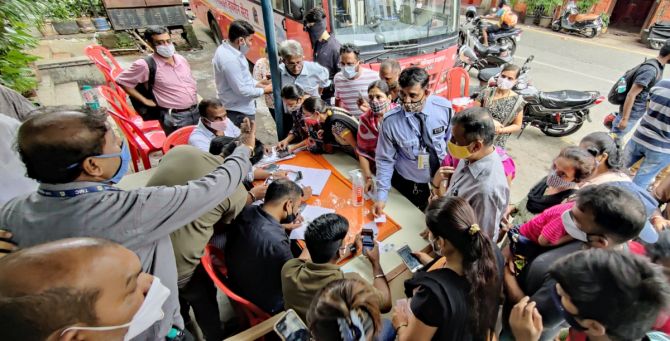So vaccinate employees and families, their staff at home, rickshaw drivers, milkmen, service providers, shopkeepers and street vendors, says Naushad Forbes.

A recent Economist issue berates the G7, that recently met in Cornwall.
Vaccinating two-thirds of the world by April 2022 would cost $50 billion, and provide a return of 17,000 per cent in four years.
Hundreds of thousands of lives would be saved and global output would be higher by $9 trillion.
By committing 1 billion doses to the world, the G7 thought it had done a great thing. The Economist correctly points out that it has missed the investment opportunity of the century.
The same applies to India. This year's Budget allocates Rs 35,000 crore (Rs 350 billion) for vaccines. The single locked-down month of April 2020 saw a shortfall in goods and services tax collections of Rs 70,000 crore (Rs 700 billion).
And it applies at the level of each firm. The cost of vaccinating all of our company's members is a tiny fraction of the loss in output in even one month from disruptions caused by lockdowns and quarantines.
The returns, in short, are so dramatic that calculating them is a waste of time. We should follow the principle that we are safe only when everyone is safe.
And everyone applies to the world, the country, to each firm and to every individual. So vaccinate employees and families, their staff at home, rickshaw drivers, milkmen, service providers, shopkeepers and street vendors.
Equity: Much has been made of the pricing of vaccines.
The revised, revised policy is for the Union government to buy 75 per cent of vaccines, which are given free to state governments. The remaining 25 per cent are to be purchased by private hospitals at a pre-declared price, which varies between vaccines. The government has also specified the price for administering these vaccines as Rs 150.
Some have argued against private purchase of vaccines. I disagree. We have now put in place the right sourcing protocol that blends equity with efficiency.
The price cap of Rs 150 is a mistake and should be scrapped. Providing three quarters of all vaccines free addresses the issue of equity. Let the remaining vaccines find their own price in the market.
In the current scarcity, prices will be higher than they should be. This high price provides the incentive for manufacturers and hospitals to scale capacity aggressively -- exactly the action we want.
As capacity ramps up, so will competition, forcing prices down and service up. That is how markets work.
Intellectual property rights:
Firms have done a remarkable job in developing multiple vaccine options within a year of the Covid pandemic. India and South Africa have asked the World Trade Organisation to temporarily waive the IPR on vaccines. The G7 has sympathised with this view, but action is still pending.
Manmohan Singh, in his letter to the prime minister on handling Covid, had recommended we trigger compulsory licences for vaccine patents. Is he right?
Patents are an artificially constructed property right. Patents provide a temporary monopoly for a period of time (20 years, under current law).
A patent needs to meet three tests of being novel, non-obvious and useful.
Debate, especially between developed and developing countries, focuses on the strength and period of protection. This property right provides the incentive for investment in innovation.
But too little attention is given to the reciprocal requirement of disclosure.
The purpose behind a patent system is that humanity benefits not by the creation of a novel invention, but by its diffusion and use.
Society provides a temporary monopoly to the inventor in return for permanent benefits from the invention after the patent runs out.
Diffusion and use can only happen through widespread disclosure.
The inventor has to be incentivised to disclose the invention, hence the property right of a patent.
Under a 1995 agreement called TRIPS (Trade Related Intellectual Property Rights) at the WTO, all countries needed to put in place national laws that protect intellectual property.
India has done so too, and our laws are fully TRIPS compliant. TRIPS permits national governments to compulsorily licence a patent for domestic use.
Countries can determine for themselves when a compulsory licence is justified.
A health emergency is perfect grounds, and the Covid pandemic is like no other health emergency for every country in the world.
Countries should first try to get a licence from the manufacturer. If they refuse, they can issue a compulsory licence.
Even then, an 'adequate' licence fee needs to be paid to the patent holder.
India has issued a compulsory licence under TRIPS once, in 2012, for the Bayer drug Nexavar, a cancer treatment.
That one use has come up constantly in discussion between India and the US in any discussion over technology.
Whenever it does, it is useful to remember that in 2001, the US government itself threatened to issue a compulsory licence for Ciprofloxacin unless the German company Bayer dramatically reduced its price for the drug. Bayer complied.
A few months ago, the US government 'encouraged' the licensing of Johnson and Johnson's single-shot Covid vaccine to its rival Merck as a way of boosting production quickly.
It would seem that the most effective use of a compulsory licence is to get the benefits of it, without actually doing it.
By going to the WTO and asking for a patent waiver, we are trying to achieve the same thing, but we need to force the pace.
My modest proposal is that we set a deadline beyond which we will issue a compulsory licence if the m-RNA and adenovirus vaccines have not been widely licensed to several Indian firms already.
Putting the pieces together
Efficient markets are characterised by many buyers and sellers, so no particular buyer or seller has the power to fix price levels.
They require free and equal information.
This means widely shared and transparent information on vaccine efficacy, prices, availability, quality of delivery and standards.
And markets benefit from reduced uncertainty.
It looks possible that Covid will become endemic and always be with us. We will then need the permanent capacity to vaccinate India as an annual task.
Knowing ahead of time that 850 million people must be vaccinated within X months helps firms plan ahead and invest ahead of demand.
Our objective should be that within three months, a dozen of our most capable pharmaceutical firms are all making vaccines by the tens of millions each month. The more the better.
Tens of thousands of hospitals and clinics should each be administering hundreds and thousands of vaccines every day.
Then let the market deliver.
Naushad Forbes is co-chairman, Forbes Marshall, past president, CII, chairman of Centre for Technology Innovation and Economic Research and Ananta Aspen Centre.












 © 2025
© 2025